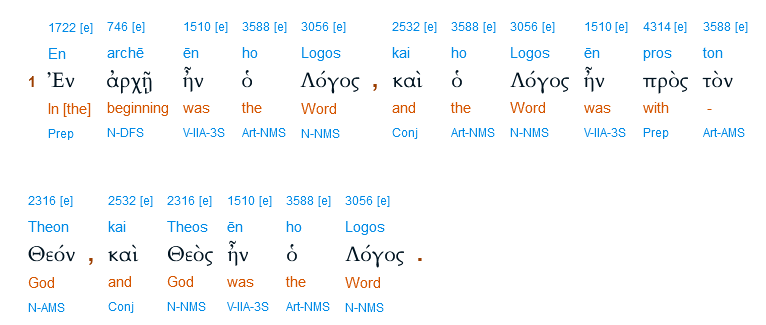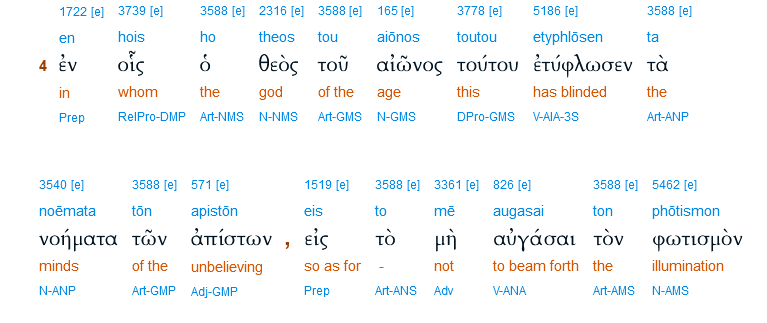I think the JW-defense may be summarized as follows:
With God
Both John 1:1b and John 1:2 explicitly state that “the Word” was “with God.” If He was “with God,” He cannot be God Himself.
No article
The Greek word theos occurs three times in John 1:1-2. Both the first and last occurrences say that the Word was in the beginning with God and, in both instances, the Greek word theos, which may be translated as “God” or as “god,” is preceded by in Greek definite article. This would appear to suggest that, in John‘s Gospel, “o theos” (the theos) fundamentally signifies God Almighty. In contrast, in the second occurrence of theos, there is no article before theos. This must be significant and implies that this does not identify God Almighty.
Origen on the missing article
Origen of Alexandria, a teacher in Greek grammar of the third century, discusses the presence or absence of the article in Commentary on John, Book II, chap, 2. He states that John uses the article when theos refers to “the uncreated cause of all things” and “all beyond the very god is made god by participation in his divinity.”
(In these quotes, I changed all capitals to lower case letters
because, when Origen wrote, people did not yet distinguish between
upper- and lower-case letters. That practice only developed many
centuries later. Consequently, “the word theos or deus, for the first
four centuries of the existence of Christianity had a wide variety of
meanings. There were many different types and grades of deity in
popular thought and religion and even in philosophical thought.”
(link))
In other words, what Origen wrote, is that the Logos is named theos without the article because He is NOT “the uncreated cause of all things.” He only participates in the divinity of the Father.
Qualitative in Meaning
The translation, “the Word was God,” seems to identify the Word as God but the scholarly consensus is that this is not the meaning of the Greek of John 1:1c. That phrase has a special grammatical construction in which theos is qualitative in meaning and describes a characteristic of “the Word.” It describes the nature of "the Word" and not His identity. For this reason, and because English uses the word “God” as a proper noun (a name for one specific Being), the translation “the Word was God” is misleading.
The following are examples to show the scholarly consensus:
[It] is clear that in the translation "the Word was God", the term God
is being used to denote his nature or essence, and not his person.
But in normal English usage "God" is a proper noun, referring to the
person of the Father or corporately to the three persons of the
Godhead. Moreover, "the Word was God" suggests that "the Word" and
"God" are convertible terms, that the proposition is reciprocating.
But the Word is neither the Father nor the Trinity … The rendering
cannot stand without explanation." (Harris, Murray J., Jesus as God:
The New Testament Use of Theos in Reference to Jesus, 1992, Baker
Books, pub. SBN 0801021952, p. 69 – my emphasis)
“It is necessarily without the article (theós not ho theós) inasmuch
as it describes the nature of the Word and does not identify His
Person. (B. F. Westcott quoted by C. F. D. Moule (Lady Margaret's
Professor of Divinity in the University of Cambridge. An Idiom-Book of
New Testament Greek. Cambridge: University Press. p. 116. ISBN
9780521057745.)
Philip Harner (Qualitative Anarthrous Predicate Nouns: Mark 15:39 and
John 1:1, published in Journal of Biblical Literature, Vol. 92,
Philadelphia, 1973, p. 85) concluded: “In many instances we may look
primarily for a qualitative emphasis in anarthrous predicate nouns
that precede the verb.” He suggests John 1:1 would be best translated
as "the Word had the same nature as God." He criticizes the "the Word
was God"-translation because "the English reader might not understand
exactly what John was trying to express."
Professor Jason BeDuhn (Truth in Translation: Accuracy and Bias in
English Translations of the New Testament) argues that the best
translation of John 1:1c would be, "And the Word was divine" (Chapter
11).
What John 1:1c says, therefore, is that the Son is of the same nature as God. This is interpreted by the Trinity doctrine as that the Word is God Himself, but that is directly opposed to the statement in John 1:1b and 1:2 that the Word was “with God,” which means that the Word is distinct from God.
An alternative interpretation is the one presented by the Logos-Christology of the second to fourth centuries which regarded the Word as part of the substance of God that was emitted from God to become a separate Being. In this view, the Word is of the same uncreated substance as God but ontologically subordinate to the Father because He is only part of the substance of God. (For an explanation of Logos-Christology, see Real Issue.)
Still another possible interpretation is that the Word’s nature is similar to God’s nature. This was one of the views during the fourth-century Arian Controversy, namely the homoiosios view.
Subordinate
By saying that the Word was “with God,” John implies that the Word is subordinate to God; not only after He became a human being, but also in His pre-existence. John repeats this principle when he says that God created all things “through” the Word (John 1:2), for that implies that the Father is the ultimate Source of Creation. We also must read John 1:18 as an extension of John 1:1-2, which describes the Son as the only-begotten. That He was begotten by God identifies Him as God’s only true family, but still describes Him as subordinate to the Father, who is the “the uncreated cause of all things,” to use a phrase from Origen.
That He is of the same nature as God (John 1:1c) may imply that He is ontologically equal with the Father but, functionally, He is subordinate to the Father.
This begins a general theme in this gospel. Over 30 times John states that the Father sent Jesus Christ. Such statements also imply that Jesus Christ was subordinate to the Father in His pre-existence. So, contextually, it would be out of place to call Jesus God in John 1:1c.
Acts 28:6
Acts 28:6 has a similar grammatical construction (anarthrous predicate nouns that precede the verb) but is translated, “he (Paul) was a god.”
Interpretation
Theos without the definite article is sometimes translated as “God” (John 1:1) and other times as “a god” (Acts 28:6). Theos with the definite article is also sometimes translated as “god” (e.g., 2 Corinthians 4:4). In other words, how theos is translated is as much a matter of interpretation as it is a matter of grammar. Beduhn in Truth in Translation: Accuracy and Bias in English Translations of the New Testament chapter 11 states:
This applies to all possible translations of John 1:1c.
"Translators of the KJV, NRSV, NIV, NAB, New American Standard Bible,
AB, Good News Bible and LB all approached the text at John 1:1 already
believing certain things about the Word...and made sure that the
translations came out in accordance with their beliefs.... Ironically,
some of these same scholars are quick to charge the NW translation
with "doctrinal bias" for translating the verse literally, free of KJV
influence, following the sense of the Greek. It may very well be that
the NW translators came to the task of translating John 1:1 with as
much bias as the other translators did. It just so happens that their
bias corresponds in this case to a more accurate translation of the
Greek."
Scholars
Certain non-JW scholars, although they oppose that translation, express some sympathy for the NW translation:
Dr. Jason BeDuhn (of Northern Arizona University) in regard to the
Kingdom Interlinear's appendix that gives the reason why the NWT
favoured a translation of John 1:1 as saying the Word was not "God"
but "a god" said: "In fact the KIT [Appendix 2A, p.1139] explanation
is perfectly correct according to the best scholarship done on this
subject."
Murray J. Harris has written: "Accordingly, from the point of view of
grammar alone, [QEOS HN hO LOGOS] could be rendered "the Word was a
god …" -Jesus As God, 1992, p. 60
C. H. Dodd says: "If a translation were a matter of substituting
words, a possible translation of [QEOS EN hO LOGOS]; would be, "The
Word was a god". As a word-for-word translation it cannot be faulted."
Other Translations
A number of Bible translations in English, French, and German render the text in a way similar to the New World Translation, conveying the idea that “the Word” was “a god; divine; a divine being; of divine kind; godlike.” See the Wikipedia article on John 1:1 for a list. For example:
"and the Word was a god" – The New Testament in Greek and English (A.
Kneeland, 1822.)
The Ancient Coptic Translation
The earliest translations of the Christian Greek Scriptures (before the fourth century Arian Controversy) were into Syriac, Latin and Sahidic Coptic. But the Sahidic Coptic text is especially interesting because Syriac and Latin, like the Greek of those days, do not have an indefinite article while Coptic does. Moreover, scholar Thomas O. Lambdin, in his work Introduction to Sahidic Coptic, says: “The use of the Coptic articles, both definite and indefinite, corresponds closely to the use of the articles in English.” Since the Sahidic Coptic translation uses an indefinite article with the word “god” in John 1:1c, when rendered into modern English, the translation reads: “and a God was the Word” (See, Sahidic Coptic text). This translation highlights a quality of “the Word” and shows how John 1:1 would have been understood back then. They did not equate him with his Father; the almighty God.
I would be eager to hear from JWs whether I understand their theology correctly.



